There are dozens of decisions to make when you start a blog or build a niche website (one of our recommendations for a source of passive income), and choosing a web hosting provider is easily one of the most important.
Your web host is the company that ensures your site is constantly live and up-to-date with your chosen design and files. Some web hosting companies also extend valuable services to their customers, ranging from assistance with marketing to 24/7 customer support.
Comparing the best web hosting companies can be totally overwhelming, which is why we pored over all the top options today to create this ranking. If you don’t want to read this entire guide, you should know that Bluehost is easily our top pick among web hosting companies.
Not only are their starter plans insanely affordable, but they also offer extra functionality and tools that can make getting started a breeze.
The Most Important Factors
- Cost of Services: For web owners who are just starting out, keeping ongoing expenses under control is crucial. We compared hosting providers to ensure the ones in our ranking offer some affordable “starter” plans that won’t cost an arm and a leg. We also made sure the more expensive hosting plans for advanced websites offered plenty of value.
- Customer Support: Because maintaining a live and functional website is crucial at all times, we looked for web hosting companies that offer 24/7 customer support.
- Plan Variety: Because different types of websites need different features, we looked for hosting companies that offer a broad range of plans to meet unique client needs. This includes shared hosting plans, dedicated hosting plans, and certain high-performance hosting solutions.
- Network Security: The security of your network is crucial, which is why we only looked at hosting providers whose network security is standard for the industry or better.
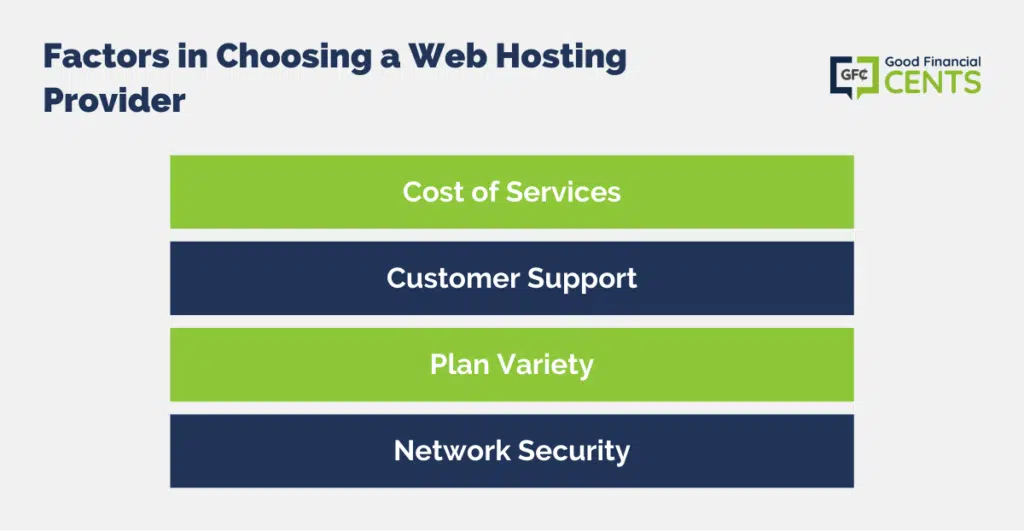
Best Web Hosting Companies
The best web hosting companies offer quality services for a monthly fee that most website owners can afford. They also come with excellent customer service that is available around the clock as well as valuable tools that can help you take your website to the next level.
| COMPANY | BEST FOR | GET STARTED |
| Best Overall | Get Started | |
| Best Freebies | Get Started | |
| Best for Unlimited Websites | Get Started | |
| Best Budget Option | Get Started | |
 | Best for High Traffic Sites | Get Started |
Web Hosting Company Reviews
You really need to do some digging to figure out which web host offers the services you need at a monthly cost you can afford. The following reviews can help you pick among the best web hosting services that made our ranking.
Bluehost: Best Overall

Why It Made the List: When it comes to web hosting plans for business owners and bloggers, BlueHost is typically the first company people turn to. Shared hosting plans typically start at around $2.95 per month, so this provider can be insanely affordable. Of course, you can also utilize Bluehost for a VPS plan with more power, control, and flexibility or for dedicated hosting with more customization.
Bluehost also offers special features when it comes to integrating and maintaining your WordPress site, and they offer 24/7 customer support that makes resolving web problems a breeze. We like the fact that you can call Bluehost for customer support or chat with an expert on the web if you prefer.
Also note that Bluehost plans come with a dedicated email address and that Bluehost makes it easy to transfer an existing domain or begin hosting a new website. Bluehost even offers a migration concierge service that can help you move your site over once you’re ready.
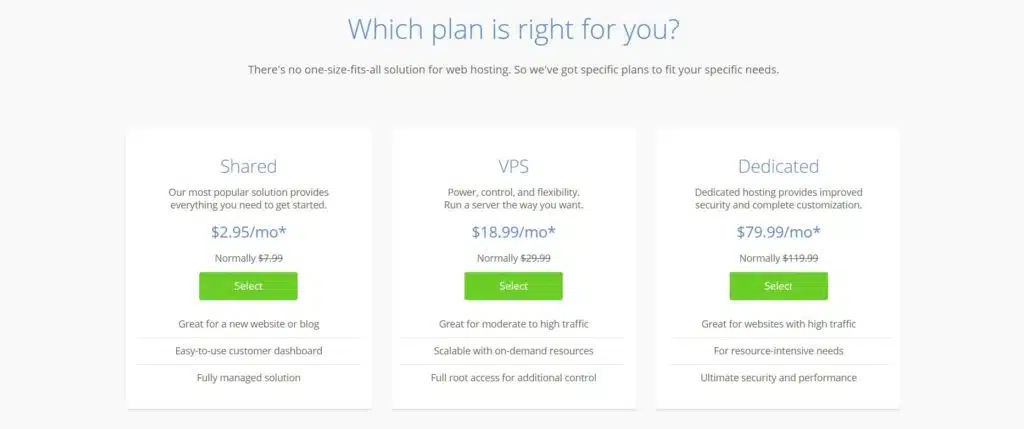
What Holds It Back: One major downside of Bluehost is the fact that you can only host your website in the United States. Their starter hosting plans are also fairly limited, so you could wind up having to pay for a more expensive plan as your website grows.
HostGator: Best Freebies
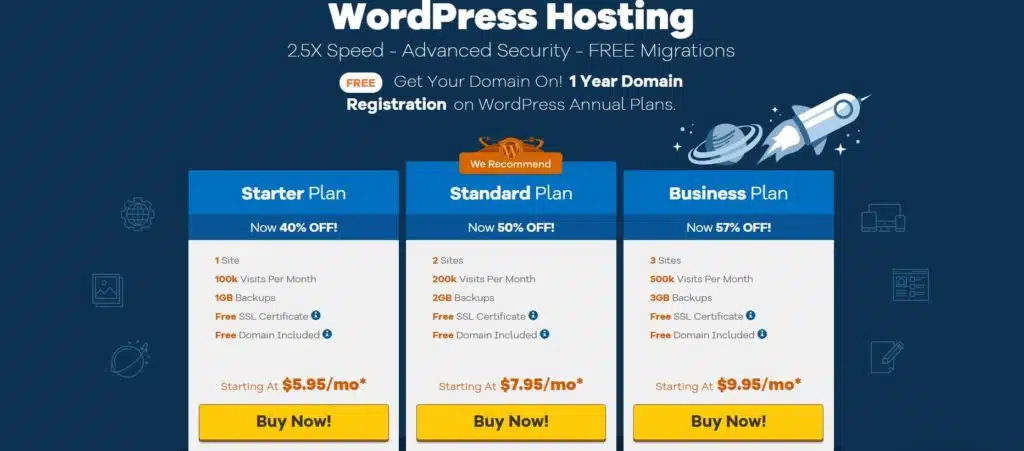
Why It Made the List: HostGator is another popular hosting provider that tends to work well for beginners and intermediate website owners. A basic hosting builder plan from HostGator starts at just $5.95 per month, and this plan is good for sites with up to 100,000 visits per month. You’ll receive 1GB of backups as well as a free SSL certificate and a free domain.
With that being said, you can also upgrade to a Standard or Business WordPress hosting plan, both of which cost only slightly more. These plans work better for websites with more traffic overall.
As a side note, HostGator also offers Website Builder plans that are geared toward new bloggers, VPS hosting, and dedicated hosting. They offer 24/7 customer service support, and they can help you migrate your site from another host. You also get a 45-day money-back guarantee that lets you try HostGator without a financial commitment.
Finally, HostGator promises to have your website live and functional 99.9% of the time. This promise speaks for itself.
What Holds It Back: The biggest complaint we hear about HostGator is its lack of email support. You need to call in or chat to get help with your website, which can be considerably more time-consuming when compared to sending off an email.
SiteGround: Best for Unlimited Websites
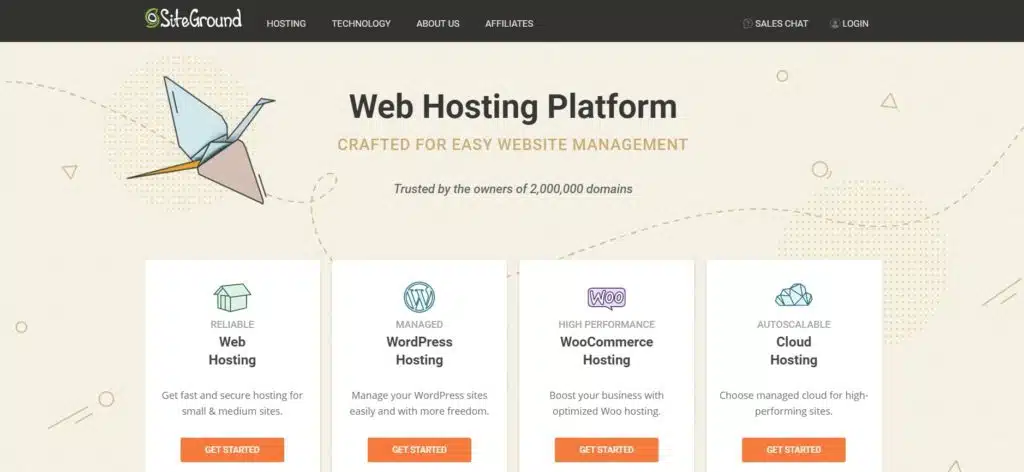
Why It Made the List: SiteGround offers web hosting, WordPress hosting, WooCommerce hosting, and Cloud hosting, along with easy and fast website-building tools and a smooth website transfer process. Their hosting plans start at just $3.95 per month, yet this beginner plan is only good for single-site hosting. With that being said, their GrowBig and GoGeek plans include unlimited websites, so they’re a great option if you want to set up hosting for multiple domains you own.
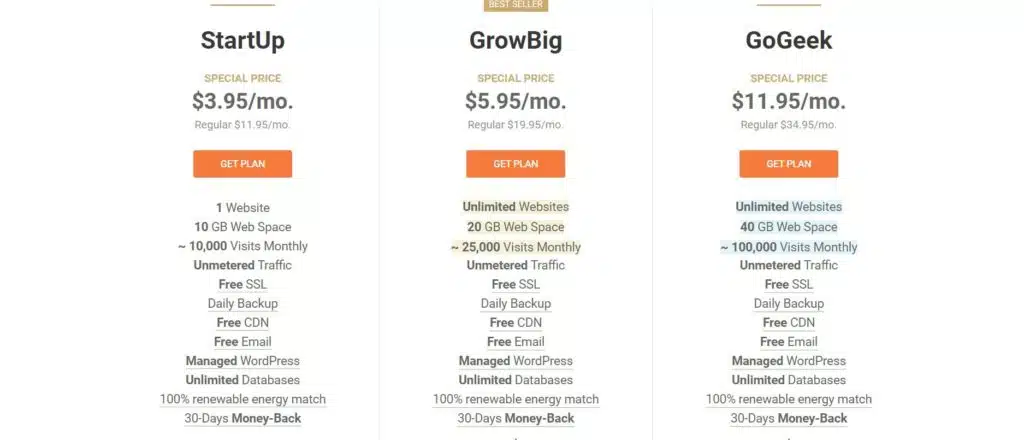
SiteGround’s GrowBig plan is their bestseller, and it’s easy to see why. This plan is for unlimited websites, as we mentioned, and you get 20 GB of webspace. You also get a free SSL certificate, daily backups, free email, managed WordPress, and a 30-day money-back guarantee, among other perks.
SiteGround is well known for its customer service, including the fact that it offers 24/7 assistance via phone, email, or chat. They also offer top-notch security and reliable email service, both of which are important as you get your business off the ground.
What Holds It Back: One major downside that comes with SiteGround hosting is the fact that their plans come with limited data storage. Also note that their introductory pricing is on the low end but that you’ll pay considerably more for hosting once your introductory offer period ends.
Hostinger: Best Budget Option

Why It Made the List: Hostinger made our list as the best budget option based on the affordability of their shared hosting plans for small and medium websites. You’ll pay just $0.99 per month for a Single shared hosting plan, and it’s still only $2.15 per month once the introductory period ends. Even their Premium shared hosting plans and Business shared hosting plans are only $2.89 and $3.99 per month during the introductory period, respectively.
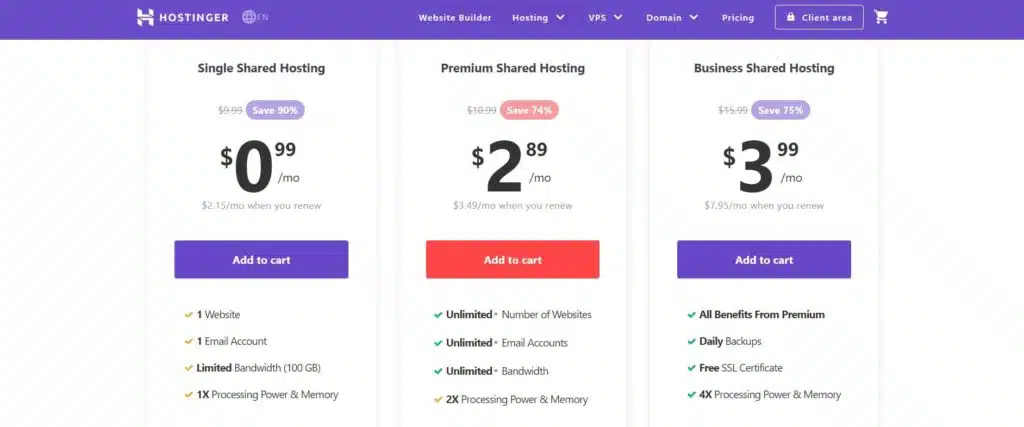
With that being said, their Single plan can be plenty for someone who is building a beginner website. This plan is only good for one site, but you do get an email address.
You also get 100GB of bandwidth, 1x processing power and memory, 24/7 customer support, a 99.9% uptime guarantee, and plenty of other perks. If you want a free domain and daily backups, however, you do have to move up to the Premium shared hosting plan.
Also note that Hostinger offers VPS hosting plans, cloud hosting, email hosting, and specific WordPress hosting plans. Hostinger also offers a 30-day money-back guarantee.
What Holds It Back: Hostinger’s cheapest hosting plan doesn’t even back your information up on a daily basis, although you can add it to your plan or upgrade to another one of their plans that includes this feature. Limited bandwidth can also be a problem with their basic hosting plan.
Liquid Web: Best for High-Traffic Sites

Why It Made the List: Liquid Web offers an array of features that make their plans better for advanced or high-traffic sites. You can choose from cloud hosting plans as well as hosting plans on a dedicated server. Their dedicated server plans are for high-performance websites that need fast speeds and the highest level of security.
Obviously, their plans are considerably more expensive than other hosting firms, yet you get so much in return. If you sign up for their Intel Xeon 1230 plan, for example, you get 5 TB of bandwidth, 250 GB Acronis Cyber Backups, 4 cores at 3.9 GHz Max, 16 32 GB RAM, and more.
Liquid Web is also known for its exceptional customer support, which is offered 24 hours a day, seven days a week, via phone, email, or chat. They also employ highly-trained technicians who know how to troubleshoot your problems and get you back online, and they don’t require contracts, so you can cancel at any time.
Liquid Web also offers a 100% uptime guarantee as well as a response from their help desk within 59 minutes each and every time.
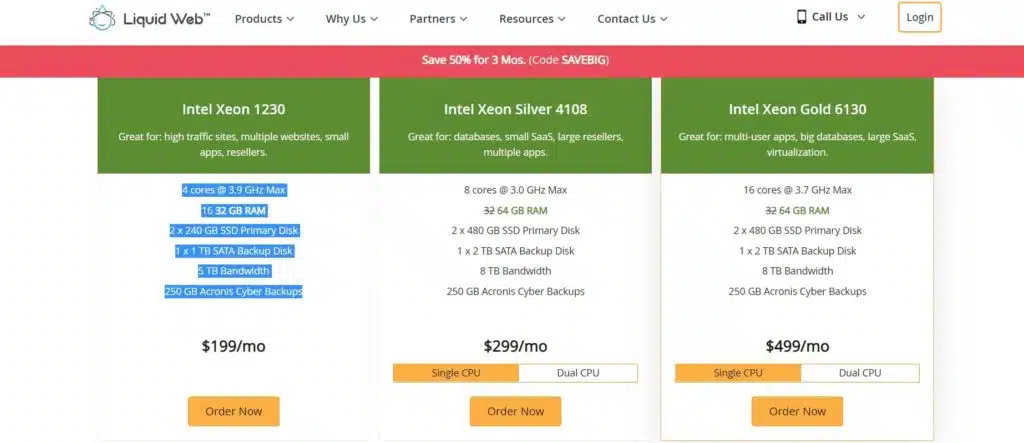
What Holds It Back: The only major downside of dealing with Liquid Web is price. You’ll get a lot of bang for your buck, but many website owners cannot justify the cost of their hosting plans until they’re earning a substantial amount of money each month.
How We Found the Best Website Hosting Providers
There are a lot of companies offering web hosting today, but these firms are not created equal. To come up with the best web hosting providers for our ranking, we considered the following criteria:
Cost and Value
We believe the cost of hosting services is crucial, and that’s especially true if you’re a beginning blogger who is trying to keep their investment at a minimum. Most of the web hosting companies on our list offer a plan for beginners for less than $5 per month.
With that being said, there is a difference between cost and value. In addition to cost, we looked for web hosting providers that offered plenty of features and support in exchange for their monthly fees. You don’t have to pay a lot to get a lot of support right out of the gate, and we believe the choices we made in this ranking reflect that.
Customer Support
We also looked for web hosting providers that offer 24/7 customer support via a support phone line, chat, or email. We gave precedence to companies that offer support through all three mediums, especially ones that have a reputation for speedy and quality customer service responses.
Migration Support
Setting up a new website can be a pain, but migrating an existing site to a new host can be a nightmare. For that reason, we looked for web hosting providers that offer exceptional migration support for free or for a fee.
Hosting Options
Finally, we all know that there are a lot of hosting options available today, ranging from VPS hosting to cloud hosting and shared hosting. We looked for companies that offer a variety of options at different price points that could make financial sense for a wide range of business models.
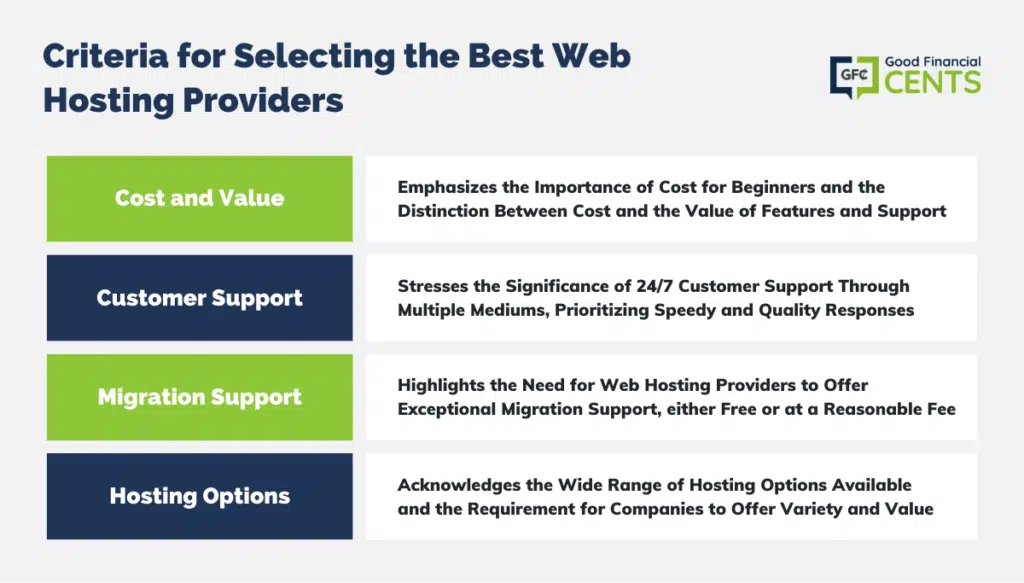
A Few Tips When Choosing Your Hosting Provider
Choosing a web hosting plan and provider can be overwhelming, yet the decision you make can have an impact on your website and its functionality for years to come. Whether you’re an advanced e-commerce expert, an established blogger, or a newbie, these tips can help you pick a web hosting plan that will work for your needs.
- Don’t be afraid to start small. If you’re just starting out, you shouldn’t spend too much time picking a web hosting plan. Bluehost is an easy default option for most people since it is easy to set up and incredibly affordable on a month-to-month basis.
Don’t be afraid to start with a basic web hosting plan that can help you launch your website, and remember that you can always upgrade to a plan with more storage or features later on.
- Remember that introductory pricing won’t last forever. Most web hosts offer a cheap introductory price for their web hosting plans, but it’s important to know that the lowest prices don’t last forever. As you compare web hosting based on affordability, make sure to compare introductory prices and long-term prices to determine how much you’ll pay after the first year.
- Do some research to determine the type of hosting you need. Do you need hosting on a dedicated server? Are you okay with a shared hosting plan? Maybe you need a hosting plan that is geared toward e-commerce sites.
Either way, it helps to have an understanding of the type of hosting you need ahead of time. That way, you can compare plans from different providers on an apples-to-apples basis.
- Consider hosting plans that can grow with you. If you hate the idea of switching hosts, you may also want to consider companies that offer tiered hosting plans that can grow right along with you. This means starting with a basic plan but being open to switching to a premium plan with more features and faster speeds as time goes on.
You may also want to start with a shared hosting plan and then migrate to dedicated hosting or VPS hosting as your business grows.
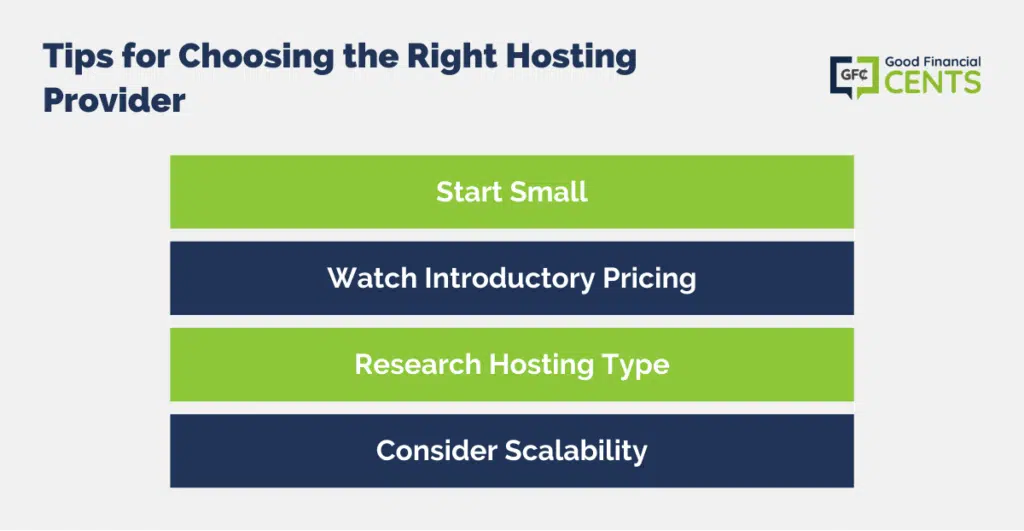
Definitions for Common Web Hosting Terms
Backup: Some web hosting providers advertise their “backup” services. This means that they back up your data on a regular basis (usually a daily basis) to make sure new information on your website isn’t lost.
Bandwidth: This term is used to describe the rate of data transfer within a given amount of time. More bandwidth means you’ll have faster speeds.
Blog: Blog is a term commonly used to describe a website run by an individual or group of individuals. Some blogs serve as personal diaries, whereas other blogs are set up to earn income on a passive basis.
Cloud Hosting: Cloud hosting allows your website to run on a server that stores all your data virtually in the cloud.
Dedicated Server: You can sign up for a shared hosting service, but you can also opt for a dedicated server instead. This means you’ll have access to a single dedicated server that is set up to host only your account, giving you complete control and the potential for higher performance.
Domain Name: Your domain name is the name you give your website. An example of a domain name is GoodFinancialCents.com.
Server: A server is a system that serves as the home of your website, and most servers are owned by web hosting providers.
Shared Hosting: Shared hosting plans allow you to share server space and resources with other users, typically at a much lower cost. For that reason, shared hosting is ideal for beginning bloggers.
Site Speed: Site speed is a term used to describe how fast your website is able to operate.
VPS Hosting: VPS stands for “virtual private server.” This type of hosting lets you access virtualized technology that allows your website to be hosted on a dedicated server with more than one user.
WordPress: WordPress is a popular blogging platform that many people use to build and oversee their websites. Many web hosting plans also integrate with WordPress for ultimate functionality and convenience.
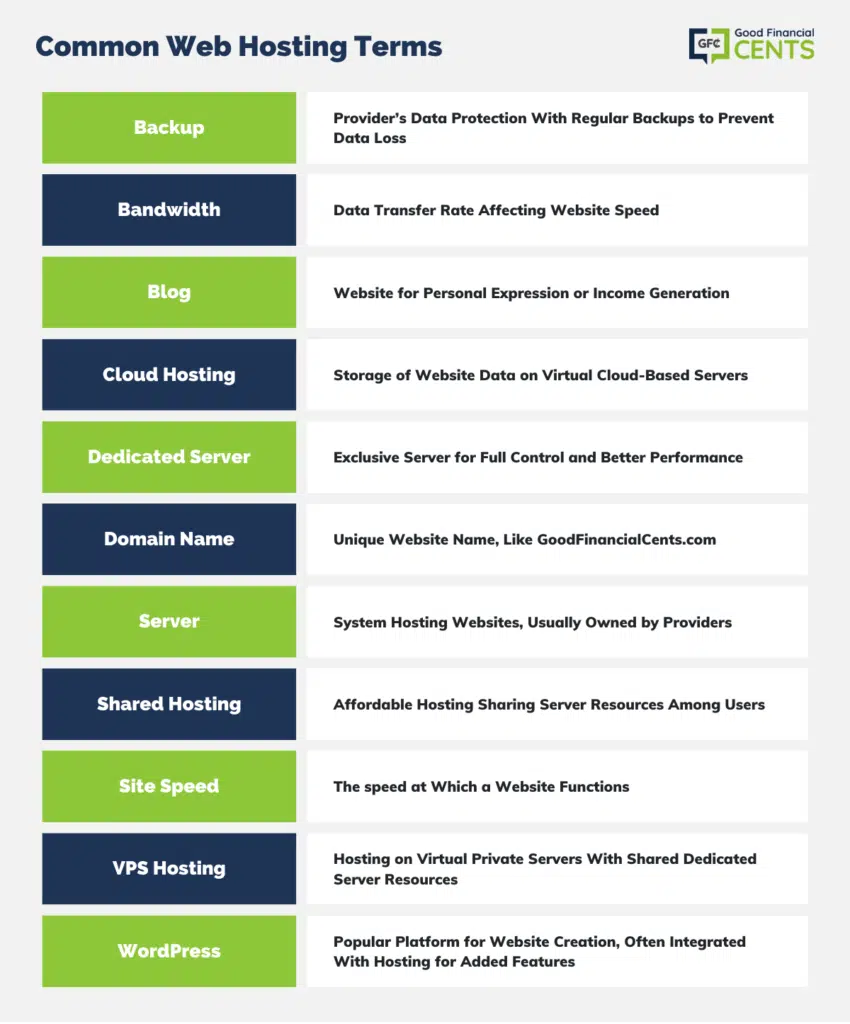
Summary: Best Web Hosting Services
The Bottom Line: Best Web Hosting Providers of 2025
In the competitive landscape of web hosting providers in 2025, the choice of a suitable host proves pivotal for website owners. The most crucial factors considered are cost-effectiveness, robust customer support, versatile plans, and unwavering network security.
Bluehost emerges as a standout choice with its affordability and comprehensive features. HostGator offers enticing freebies and user-friendly plans, while SiteGround excels at hosting multiple websites. Hostinger impresses as a budget-friendly option with extensive offerings, while Liquid Web caters to high-traffic sites with powerful solutions.
Choosing the right host means evaluating needs, considering scalability, and comprehending key hosting terms.







